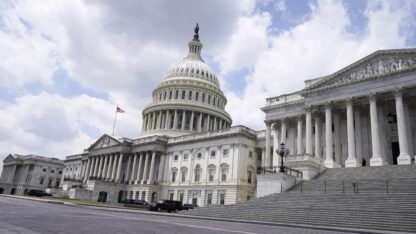Americans older than six months should get an updated COVID-19 booster this fall, according to a recommendation the Atlanta-based Centers for Disease Control and Prevention issued Tuesday.
The vaccine should be available by later this week, the CDC said in a statement.
“We have more tools than ever to prevent the worst outcomes from COVID-19,” said Director Mandy Cohen. “CDC is now recommending updated COVID-19 vaccination for everyone 6 months and older to better protect you and your loved ones.”
The CDC’s Advisory Committee on Immunization Practices voted to approve the updated booster shots, followed by a written statement from Cohen. The U.S. Food and Drug Administration on Tuesday approved an updated booster from Moderna and one from Pfizer.
The CDC noted in its announcement that protection from previous COVID-19 vaccines and boosters wanes, and that vaccines lower the likelihood of contracting long COVID.
Georgia public health officials continue to stress vaccination, particularly among those who are at higher risk of severe illness. But it remains to be seen how this newest booster will be received.
Dr. James Curran, who chairs the Board of Public Health, noted during a discussion about COVID-19 at Tuesday’s board meeting that some prominent figures have complicated the picture of who should receive the boosters, which could lead to even lower numbers of people rolling up their sleeve for the shot.
For example, Paul Offit, the director of the Vaccine Education Center at Children’s Hospital of Philadelphia, said he did not plan to get the shot again, instead trusting his immune system’s familiarity with the virus at this point to protect him from serious illness, KFF Health News reported. He’s 72 years old.
“It’s conceivable that we could end up with some cacophony out there, which makes it difficult for people to understand whether or not they should get a booster and whether or not insurance companies will pay the rather exalted price for the booster,” Curran said.
Georgia’s state epidemiologist Dr. Cherie Drenzek said this will likely be “a transition year in many ways.” But she said one thing that remains clear and consistent is that the vaccine protects against severe outcomes.
“There is not a doubt that these vaccines can indeed and do indeed provide protection for our most vulnerable,” Drenzek said.
In Georgia, there has been a slight uptick in hospitalizations and death in recent months, but both measures remain remarkably low, especially when compared to other phases of the pandemic, Drenzek said.
Public health officials, though, are bracing for a potential repeat of the “tripledemic” seen last year with the convergence of COVID-19, RSV and the flu cases.
“Despite the fact that we may not be able to precisely forecast what the COVID increases will look like and what the season will hold, no matter what I think it’s important to realize that we cannot be complacent,” Drenzek said.
“Despite the fact that there’s widespread immunity, SARS-CoV-2 is still with us and will remain with us for years. It’s proven adept at changing and it has opportunities to change, particularly among immune-compromised people,” she said.
The CDC’s recommendation didn’t come with any plans to get shots in arms from the Biden administration, which ended the public health emergency for COVID-19 earlier this year.
Uptake of COVID-19 shots has dropped since vaccinations were first approved in the final weeks of 2020 and initially rolled out by the Trump administration.
While more than 270 million people, about 81% of the country, got at least one dose of the original vaccine, that number dropped to just 56 million people, or about 17% of Americans getting the bivalent booster that was approved last year, according to CDC statistics.
The CDC noted in its announcement Tuesday that many Americans can still get the booster doses for free, even though the public health emergency is over.
“For people with health insurance, most plans will cover COVID-19 vaccine at no cost to you. People who don’t have health insurance or with health plans that do not cover the cost can get a free vaccine from their local health centers; state, local, tribal, or territorial health department; and pharmacies participating in the CDC’s Bridge Access Program. Children eligible for the Vaccines for Children program also may receive the vaccine from a provider enrolled in that program.”
Health and Human Services Secretary Xavier Becerra said in a written statement that everyone eligible should “get an updated COVID-19 vaccine to protect themselves and their loved ones.”
“Following the Biden-Harris Administration’s launch of the largest adult vaccination program in our nation’s history, COVID-19 vaccines saved millions of lives, kept countless people out of the hospital, and provided peace of mind for the country.”
This story was provided by WABE content partner Georgia Recorder.









